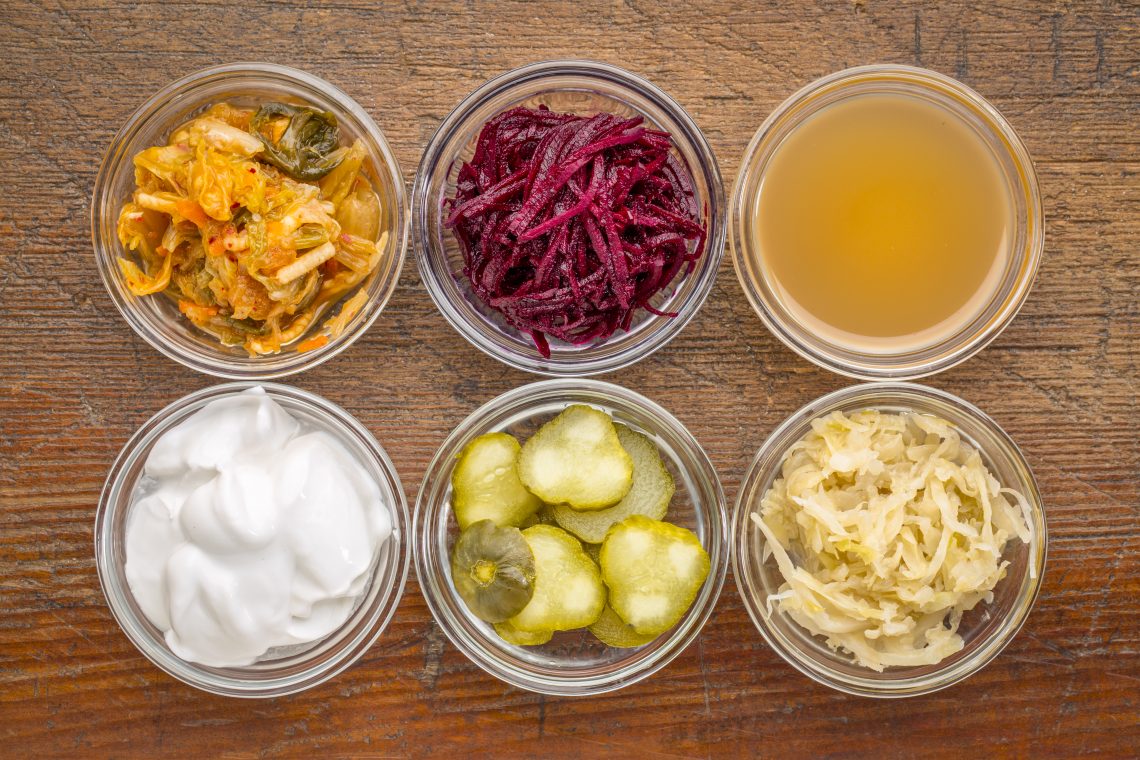Here are 12 foods for a healthy gut. Did you know the secret to optimal health lies within your gut? With a staggering 70% of your immune system residing in this complex ecosystem, maintaining digestive health has never been more crucial.
Embrace the power of nutrition and unlock the potential of these top 12 foods for a healthy gut, designed to enhance your digestive capabilities naturally! Say goodbye to discomfort and hello to improved overall well-being as we delve into probiotics, fiber-rich foods, fermented delicacies, and other gut-friendly ingredients.
Why A Healthy Gut Is Important
A healthy gut plays a crucial role in maintaining overall well-being. It is home to trillions of microorganisms, collectively known as the gut microbiome, which includes beneficial bacteria that aid digestion, boost immunity, and even contribute to mental health.
Research has shown that an optimal balance between friendly and harmful bacteria in the gut helps regulate various body processes like nutrient absorption, metabolism, and immune response.
Additionally, a strong connection exists between our digestive system and brain function – often referred to as the “gut-brain axis.” The friendly microorganisms residing in our gastrointestinal tract produce neurotransmitters such as serotonin and dopamine (linked with mood regulation), thereby influencing feelings of happiness or anxiety.
Incorporating foods rich in probiotics (live bacteria), prebiotics (non-digestible food components that encourage bacterial growth), fiber-rich foods (to promote bowel movement) along with fermented foods enhances the diversity of these good microbes helping us maintain a healthy gut environment.
By doing so not only do we improve nutrient absorption from our diets but also reduce instances of bloating discomforts associated with irritable bowel syndrome(IBS).
Top 12 Foods For A Healthy Gut
The top 12 foods for a healthy gut include probiotic-rich foods like sauerkraut and yogurt, prebiotic foods such as whole grains and garlic, fermented foods like kimchi and kefir, fiber-rich fruits and vegetables, omega-3 rich fish oil, bone broth, coconut products like oil or milk, apple cider vinegar and spices like ginger and turmeric.
Probiotic-rich Foods
Probiotic-rich foods are essential for a healthy gut as they contain strains of friendly bacteria that support the growth of beneficial microorganisms in the digestive system. Here are some examples of probiotic-rich foods:
- Yogurt: Contains live and active cultures that aid digestion and boost immune function.
- Kefir: A fermented milk drink that contains up to 10 times more probiotics than yogurt.
- Sauerkraut: Made from fermented cabbage, this dish is full of healthy bacteria and helps with nutrient absorption.
- Kimchi: A Korean dish made from fermented vegetables, including cabbage, radish, and scallions, which promotes gut health.
- Miso: A paste made from fermented soybeans that is rich in probiotics and beneficial enzymes.
- Tempeh: Made from whole soybeans, tempeh is loaded with probiotics and has a meaty texture that makes it perfect for vegetarian dishes.
- Kombucha: A fermented tea drink that supports digestion and regulates bowel movements.
- Pickles: Fermented pickles can help to regulate digestion and improve nutrient absorption in the gut.
Incorporating these probiotic-rich foods into your diet can help maintain a healthy gut microbiome, reduce inflammation, and prevent digestive disorders such as bloating, constipation, or diarrhea. So start adding them to your meals today!
Prebiotic Foods
Photo by on Pexels
Prebiotics are plant fibers that are not digested by the body but instead provide nourishment for the good bacteria in our gut. These foods include:
- Bananas: rich in fiber and the prebiotic fructooligosaccharides, which supports the growth of beneficial bacteria.
- Onions: a great source of inulin, which helps increase the number of Bifidobacteria in your gut.
- Garlic: contains fructooligosaccharides, which can support the growth of friendly gut bacteria and stimulate digestion.
- Asparagus: high in soluble fiber, which feeds friendly gut bacteria and promotes overall digestive health.
- Chicory Root: one of the richest sources of inulin, a prebiotic fiber that promotes healthy digestion and has been linked to reduced inflammation.
By incorporating these prebiotic-rich foods into your diet, you can help feed and support your gut microbiome for optimal health and digestion.
Fermented Foods
Fermented foods are a favorite among gut health enthusiasts and for a good reason. They contain beneficial bacteria, which can help improve digestion and overall gut health. Here are some fermented foods you should consider incorporating into your diet:
- Kombucha – A fermented tea drink that contains probiotics and acetic acid, which may help improve gut health.
- Sauerkraut – Made from fermented cabbage, sauerkraut is high in probiotics and vitamin C.
- Kimchi – A spicy Korean side dish made from fermented vegetables, which is rich in vitamins A and C.
- Miso – A traditional Japanese seasoning made from soybeans that are fermented with salt and a koji culture.
- Tempeh – An Indonesian dish made from fermented soybeans that are pressed into a cake-like form, rich in protein and fiber.
- Kefir – A fermented milk drink that contains friendly bacteria known as probiotics.
By adding these delicious foods to your diet, you’ll be doing your gut microbiome a favor by providing it with beneficial bacteria.
Fiber-rich Foods
Fiber plays a crucial role in keeping our digestive system healthy by promoting regular bowel movements and supporting the growth of good bacteria in the gut. Some excellent sources of fiber include:
- Whole grains – such as brown rice, quinoa, oats, and whole wheat bread. These foods are rich in both soluble and insoluble fiber.
- Legumes – beans, lentils, chickpeas, and peas are all excellent sources of both soluble and insoluble fiber.
- Berries and fruits – raspberries, blackberries, apples, bananas, pears, and oranges all contain high amounts of dietary fiber.
- Vegetables – leafy greens like spinach and kale are excellent sources of fiber, as well as cruciferous vegetables like broccoli and cauliflower.
- Nuts and seeds – almonds, chia seeds, flaxseeds, and pumpkin seeds are all high in fiber.
Eating a variety of these fiber-rich foods will help ensure that you’re getting enough to support your digestive health naturally.
Omega-3 Foods
Photo by on Pexels
Including omega-3 foods in your diet is essential for a healthy gut. These foods are rich in healthy fats, which work to reduce inflammation and improve overall digestive health. Here are some of the best sources of omega-3s:
- Fatty fish such as salmon, tuna, and mackerel
- Flaxseeds and chia seeds
- Walnuts
- Soybeans
- Spinach
- Broccoli
Adding these foods to your meals regularly can help maintain a healthy balance of gut bacteria, promote nutrient absorption, and may even lower the risk of developing digestive disorders. Aim for at least 2 servings of fatty fish per week and sprinkle flax or chia seeds on top of yogurt or oatmeal for an added boost of omega-3s.
Bone Broth
Bone broth is a nutrient-dense food that has been shown to be beneficial for gut health. It’s made by simmering animal bones, usually from beef or chicken, along with vegetables and herbs in water for several hours until the collagen and minerals are extracted.
The resulting liquid contains amino acids like glycine and proline, which support the gut lining.
Consuming bone broth regularly may also reduce inflammation throughout the body due to its high concentration of anti-inflammatory compounds. This can be helpful for individuals suffering from inflammatory bowel disease or other digestive disorders.
Coconut Products
Coconut products are a great addition to your diet for a healthy gut. They are packed with healthy fats that help to reduce inflammation in the gut and promote healthy digestion. Here are some coconut products you should consider incorporating into your diet:
- Coconut Oil: This oil contains medium-chain triglycerides (MCTs) that boost the growth of good bacteria in the gut, thereby promoting digestive health.
- Coconut Water: This is a natural electrolyte drink that helps to keep the body hydrated and flush out toxins from the gut.
- Coconut Milk: This milk is rich in lauric acid which supports the growth of good bacteria in the gut and makes digestion easier.
- Coconut Flour: This flour is gluten-free and high in fiber, making it an excellent choice for improving digestion and nutrient absorption.
- Unsweetened Shredded Coconut: This can be added to meals or snacks for a fiber boost, which helps to support healthy bowel movements.
Overall, coconut products offer many benefits for a healthier gut. Incorporating these foods into your diet can help you achieve optimal digestive health naturally while improving nutrient absorption and reducing inflammation throughout your body.
Photo by on Pexels
Apple Cider Vinegar
Apple cider vinegar (ACV) is a natural digestive aid that has been used for centuries. It contains acetic acid, which helps to stimulate the digestive juices and enzymes in the stomach, aiding digestion and nutrient absorption.
ACV also has antibacterial properties that can help to keep harmful bacteria at bay in the gut.
One easy way to incorporate ACV into your diet is by adding it to dressings or marinades for salads or roasted vegetables. You can also mix a tablespoon with water and drink it before meals as a daily tonic.
However, be sure to dilute ACV with water since its acidic nature could harm tooth enamel if consumed undiluted.
Kefir
Kefir is a fermented drink that has been around for centuries. It’s made from milk and kefir grains, which consist of yeast and bacteria. This sour-tasting liquid is packed with probiotics, beneficial bacteria that improve gut health by restoring the balance of the microbiome.
Kefir also contains vitamins B2, B12, D, calcium and magnesium – essential nutrients for maintaining healthy bones. In addition to its digestive benefits, kefir has been shown to boost immunity and reduce inflammation throughout the body.
Garlic
Photo by on Pexels
Garlic is well known for adding a distinctive flavor to dishes, but it also offers numerous benefits for gut health. Garlic contains prebiotic properties that promote the growth of good bacteria in your digestive system.
This means that garlic can help improve digestion and reduce inflammation in the gut.
Adding garlic to your diet is easy; you can chop up fresh cloves and add them to almost any dish or use roasted garlic as a delicious spread on toast or crackers. If you’re looking for an extra boost of flavor, try making homemade hummus with roasted garlic or adding minced garlic to stir-fry dishes with plenty of fiber-rich veggies.
Ginger
Ginger is a powerful root that has been used in traditional medicine for thousands of years. It’s packed with anti-inflammatory and antioxidant properties, which help to soothe the digestive tract, improve nutrient absorption and reduce inflammation.
Adding fresh or powdered ginger to your meals can offer impressive benefits for digestive health. You can grate it into stir-fries or soups, steep it in hot water for a cup of tea, or add it to marinades and dressings for an extra kick of flavor.
Additionally, studies have shown that taking ginger supplements may help alleviate symptoms of nausea and vomiting caused by chemotherapy treatment or pregnancy-induced morning sickness.
Turmeric
Turmeric is a spice that has been used for centuries in traditional medicine due to its anti-inflammatory properties. It contains curcumin, which helps to reduce inflammation in the gut and improve overall digestive health.
Turmeric can also stimulate stomach acid production, aiding digestion and nutrient absorption.
There are several ways to incorporate turmeric into your meals such as by making golden milk using turmeric powder mixed with coconut milk and honey, sprinkling turmeric onto roasted vegetables, or creating a homemade curry dish with fresh turmeric root.
Conclusion: Incorporate These Foods For A Stronger And Healthier Gut Naturally
Incorporating these top 12 foods for a healthy gut can significantly boost your digestive health naturally. Probiotic-rich foods like yogurt and fermented foods such as sauerkraut are great sources of friendly bacteria that promote a healthy gut microbiome.
Prebiotic foods like whole grains and fiber-rich fruits fuel the growth of good bacteria in your gut. Essential fatty acids from omega-3 rich foods, bone broth, coconut products, apple cider vinegar, kefir, garlic, ginger and turmeric all contribute to improving digestion and reducing inflammation.
Read more health articles at ClichéMag.com
Images provided by BingAI, Adobe Stock, Flickr, Unsplash, Pexels, Pixabay & Creative Commons





